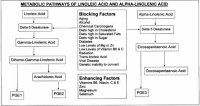I thought this deserved it's own thread.
haidut said:https://raypeatforum.com/forums/posts/86912/ OK, I will just summarize what I have seen/read and combine with what I have gotten from Peat.
1. The argument for PUFA being essential is not only wrong, it is misguided. While Peat does cite an old study, I have posted several threads on this forum showing that as recently as 1990s there were studies saying that PUFA is at best semi-essential and its daily dietary "requirements" come down to no more than 0.5% of calories. So, at the very least we have an upper bound on how essential PUFA is - i.e. if you are eating more than 1g-2g of PUFA daily at best you are not getting any benefit and at worse you are increasing the risk of cancer.
2. PUFA and its derivative eicosanoids and leukotrienes, are the major pathway to inflammation. Peat has written that his view is quite contrary to the medical dogma in the sense that he does not think there is a "healthy" level of inflammation. As far as I can see from his articles, and he is pretty explicit on this one, he thinks the lower the inflammation the healthier the organism. As such, restricting PUFA (and depleting iron, tryptophan, etc) is perhaps THE definitive approach to controlling inflammation rather than rely on later factors in the cascade such as taking aspirin to combat inflammation. The eicosanoids/leukotrienes are the major trigger of histamine/serotonin synthesis and release and without them, histamine and serotonin become a much smaller burden on the organism.
3. PUFA directly inhibit cytochrome C oxidase, unlike SFA and MUFA. In addition, PUFA are directly estrogenic by activating aromatase, again, unlike MUFA and SFA.
4. PUFA are a major inhibitor of the protective steroid pathways, especially 5-AR, but at the same time are activators of 11b-hydroxylase and aldosterone synthase. So, PUFA tend to shift the steroid pathway towards the end products cortisol, estrogen and aldosterone.
5. PUFA activate TPH, which synthesizes serotonin from tryptophan. As such, PUFA are a major metabolic inhibitor. Combined with the fact that they also promote estrogen and cortisol I am not sure there is another substance that can rival PUFA in terms of metabolism inhibition with the possible exception of ionizing radiation, which mimics PUFA effects on the body remarkably well. So, maybe the next time somebody wants to make an argument in favor of PUFA, try to think of a way to frame radiation in a positive light. If you can give me an argument for radiation, then I will listen to the argument in favor of PUFA.
6. Animals depleted in PUFA have uncoupled respiration and their metabolism and their oxygen consumption is about 70% higher than "normal" animals. The same effect was observed with people who got accidentally depleted in PUFA. You may argue for PUFA all you want, but even mainstream medicine wisened up to the fact that uncouplers are a viable treatment of several (maybe all) degenerative diseases. Go to http://www.clinicaltrials.gov and search for "uncoupler" or "uncoupling" and you will see for yourself. So, if having super fast metabolism is viable treatment for many diseases of old age and maybe aging itself then why on Earth would anybody want to consume a well-known metabolic inhibitor.
7. PUFA are immunosuppressive. This is such common knowledge that there are even several established products on the medical market based on a combination of linoleic and linolenic acid that is given IV to organ transplant patients. As far as I know the daily dose is 20g, and even though it is given IV the effects from oral intake are very similar. This should not come as a surprise given how much PUFA boosts cortisol production. Anything that suppresses your immune system chronically is likely to result in cancer in the long run.
8. PUFA is one of the main inhibitors of endogenous cholesterol synthesis. In fact, to this day this is one of their main selling point, especially the EPA/DHA kind. Anything that suppresses your cholesterol synthesis increases the risk of cancer. Statins are major carcinogen, not to mention their link to diseases like ALS and other muscular distrophies. If statins and PUFA work similarly on cholesterol and muscle then I am not sure what person in their right mind would want to load up on PUFA given the several class action lawsuits against statins and their connection to ALS, dementia, liver failure, etc.
9. PUFA is insanely hepatotoxic. I must have posted at least 10 studies on this one. Saturated fat is so far the only known substance shown to reverse chirrosis in both humans and animals. High dose vitamin K2 (MK-4) and caffeine have similar effects but probably can't fully match effects of saturated fat on fibrotic tissue. Not even acetaminophen comes close to the toxicity of PUFA to things like cytochrome P450 and glutathione reserves.
Finally, if you have read enough studies, and especially if you have worked with some sick people to see what got them better and what got them worse, then you should have enough information to decide if you want to deplete PUFA or not. Experiment is the ultimate arbiter and no amount of bickering and arguments and studies will make a difference. So, for anybody who wants to finally clear up any doubts on whether Peat is right about his stuff or not - in as little as 3-4 weeks of low fat diet, you can find out for yourself and then no amount of arguments from me or anybody else would matter.
Last edited:


